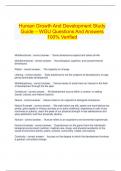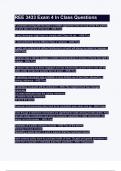Human Growth And Development Study
Guide – WGU Questions And Answers
100% Verified
Multidirectional - correct answer. Some dimensions expand and others shrink
Multidimensional - correct answer. Has biological, cognitive, and socioemotional
dimensions
Plastic - correct answer. The capacity for change
Lifelong - correct answer. Early adulthood is not the endpoint of development; no age
period dominates development
Multidisciplinary - correct answer. Various areas of study have an interest in the field
of development through the life span
Contextual - correct answer. All development occurs within a context, or setting
(social, cultural, and historic factors)
Nature - correct answer. Nature refers to an organism's biological inheritance.
Nature Example - correct answer. We walk before we talk, speak one word before two
words, grow rapidly in infancy and less so in early childhood, experience a rush of sex
hormones in puberty, reach the peak of our physical strength in late adolescence and
early adulthood, and then physically decline.
Nurture - correct answer. Nurture refers to an organism's environmental experiences
Nurture Example - correct answer. Experiences run the gamut from the individual's
biological environment (nutrition, medical care, drugs, and physical accidents) to the
social environment (family, peers, schools, community, media, and culture)
Continuity - correct answer. focuses on the degree to which the development involves
a gradual, cumulative change
,continuity example - correct answer. An oak grows from a seedling to a giant oak, it
becomes more of an oak - its development is continuous
discontinuity - correct answer. focuses on the degree to which development involves
distinct stages
Discontinuity example - correct answer. as an insect grows from a caterpillar to a
chrysalis to a butterfly, it passes through a sequence of stages in which change is
qualitative rather than quantitatively different. Similarly, at some point a child moves
from not being able to think abstractlyl about the world to being able to do so.
Stability - correct answer. Debate about whether we become older renditions of our
early experience
Stability Example - correct answer. Many argue that if an individual is shy throughout
life, this stability is due to heredity and possibly early experiences in which the infant or
young child encountered considerable stress when interacting with people
Change - correct answer. We develop into someone different from who we were at an
earlier point in development
Change example - correct answer. Developmentalists who emphasize change take
the more optimistic view that later experiences can produce change. Recall that in the
life-span perspective, plasticity, the potential for change, exists throughout the life span.
Freud's Theories - correct answer. Freud believed that people's problems were the
result of experiences early in life. He thought that as children grow up, their focus on
pleasure and sexual impulses shifts from the mouth to the anus and eventually to the
genitals. As a result, we go through five stages of psychosexual development: Oral,
anal, phallic, latency, and genital.
Erikson's Theory - correct answer. Focuses on Psychosocial. Eight Stages of human
development. Each stage consists of unique developmental task that confronts
individuals with a crisis that must be resolved.
Trust versus mistrust - correct answer. Erikson's first psychosocial stage, which is
experienced in the first year of life. The development of trust during infancy sets the
stage for a lifelong expectation that the world will be a good and pleasant place to live.
Autonomy versus Shame and doubt - correct answer. Erikson's second stage. This
stage occurs in late infancy and toddlerhodd ( 1-3 years) after gaining trust in their
caregivers, infants begin to discover that their behavior is their own. They start to assert
their sense of independence or autonomy. They realize their will. If Infants and toddlers
are restrained too much or punished too harshly, they are likely to develop a sense of
shame and doubt.
,Initiative versus guilt - correct answer. Erikson's Third stage of development occurs
during the preschool years. As preschool children encounter a widening social world,
they face new challenges that require active purposeful, responsible behavior. Feelings
of guilt may arise, though, if the child is irresponsible and is made to feel anxious.
Industry versus inferiority - correct answer. Erikson's fourth developmental stages,
occurring approximately during the elementary school years. Children now need to
direct their energy toward mastering knowledge and intellectual skills. The negative
outcome is that the child may develop a sense of inferiority -- feeling incompetent and
unproductive.
Identity Versus identity confusion - correct answer. Erikson's fifth developmental stage
that occurs during adolescent years. If adolescents explore roles in a healthy manner
and arrive at a positive path to follow in life, then they achieve a positive identity, if they
do not, identity confusion reigns.
Intimacy versus isolation - correct answer. Erikson's sixth developmental stage, which
occurs during early adulthood. Individuals face the developmental task of forming
intimate relationships. If young adults form healthy friendships and an intimate
relationship with another, intimacy will be achieved; if not, isolation will result.
Generativity versus stagnation - correct answer. Erikson's seventh developmental
stage that occurs during middle adulthood. By generativity Erikson means primarily a
concern for helping the younger generation to develop and lead useful lives. The feeling
of having done nothing to help the next generation is stagnation.
Integrity versus despair - correct answer. Erikson's eighth and final stage of
development which occurs during late adulthood. During this stage a person reflects on
the past. If the person's life review reveals a life well spent, integrity will be achieved; if
not the retrospective glances will likely yield doubt or gloom.
Piaget's cognitive Developmental Theory - correct answer. Children go through four
stages of cognitive development as they actively construct their understanding of the
world. Two processes underlie this cognitive construction of the world: organization and
adaptation. To make sense of our world we organize our experiences.
Sensorimotor stage - correct answer. Piaget's first stage that lasts from birth to 2
years old. Infants in this stage construct an understanding of the world by coordinating
sensory experiences (Such as seeing and hearing) with physical, motoric actions
The preoperational Stage - correct answer. Piaget's second stages that lasts from 2-7
years of age. Children begin to go beyond simply connecting sensory information with
physical actions and represent the world with words, images, and drawings. They are
not able to internalize mental actions
, Concrete operational stage - correct answer. Piaget's third stage that lasts from 7-11
years of age. Children can perform operations that involved objects, and they can
reason logically when the reasoning can be applied to specific or concrete examples.
concrete operational thinkers cannot imagine the steps necessary to complete an
algebraic equation, which is too abstract for thinking at this stage of development.
The formal operational stage - correct answer. Piaget's fourth and final stage that
occurs between 11-15 years of age and continues through adulthood. Individuals move
beyond concrete experiences and begin to think in abstract and more logical terms. as
part of thinking more abstractly, adolescents develop images of ideal circumstances.
Vygotsky's theory - correct answer. A sociocultural cognitive theory that emphasizes
how culture and social interaction guide cognitive development. A child's development
depends on social and cultural activities and social interactions with more skilled adults.
Information-processing theory - correct answer. Individuals manipulate information,
monitor it, and strategize about it. Unlike Piaget's theory, but like Vygotsky's theory, This
theory does not describe development as stage-like but as gradual increase capacity for
processing information.
Operant Conditioning Theory - correct answer. the theory that people learn to perform
behaviors that lead to desired consequences and learn not to perform behaviors that
lead to undesired consequences
A behavior followed by a rewarding stimulus is more likely to recur, whereas a behavior
followed by a punishing stimulus is less likely to recur.
Social Cognitive Theory - correct answer. The view of psychologists who emphasize
behavior, environment, and cognition as the key factors in development.
Ecological Theory - correct answer. Bronfenbrenner's theory that human development
is shaped by five environmental systems: microsystem, mesosystem, exosystem,
macrosystem, and chronosystem.
Microsystem - correct answer. The setting in which the individual lives. These
contexts include the person's family, peers, school, and neighborhood.
Mesosystem - correct answer. connections between microsystems
Ex. the relation of family experiences to school experiences
Exosystem - correct answer. consists of social settings in which the individual does
not have an active role and the individual's immediate context. Ex. A husband's
experience at home may be influenced by a mother's experiences at work.
Macrosystem - correct answer. The culture in which individuals live.





